Marines divide their occupations into different fields which are designated by a 4-digit number.
The first two numbers will establish the general “industry” that the Marine is in, while the last two digits will be specific for the occupation within that “industry.”
An example of this is MOS 1300. 1300 is the designation for all Marines working within the construction and trade industries — basic engineers.
The 1300 field encompasses things like:
- Metalworking
- Woodworking
- Heavy equipment operating
- Combat engineers
- Generator repairmen, and
- a myriad of other construction-related fields.
How are these MOSs designated within the 1300 field? The last two digits of the 4-digit MOS establish what the occupation is.
For example, a Marine may say that they are a 1341 or a 1316, which would then specify the job that they do within the 1300 field.
Related Article: Marine Corps Height And Weight Standards
People who are considering joining the USMC, and know that they want to work within a construction trade, can sign their contract for a 1300 MOS.
During the last week of boot camp, the drill instructors will announce the occupation for all Marines, so any Marine who joined with a 1300 designation will then find out what specialty they will be doing.
Jump to a specific MOS to learn more about what they do: 1316, 1341, 1345, 1349, 1361, 1371, 1391.
Requirements and Qualifications
Every MOS within the 1300 field will have different requirements.
However, some common traits that Marines will need when considering the 13XX field are the ability to think critically, analyze problems and situations, and be willing to get dirty and hands-on.
Occupations like the 1371, combat engineer, require normal color vision since they do work with explosives and using different colored wires.
Crossing the wrong wires can be deadly or cause lifelong impairment.
The 1345 MOS, heavy equipment operator, will require Marines to be a certain height and have a specific mechanical aptitude score on the ASVAB.
This is the same for 1341, heavy equipment mechanics.
Related Article – Marine Engineer Equipment Operator (MOS 1345): Career Details
If a person signs up for a 1300 MOS prior to attending boot camp, the Marine Corps will still route the Marine toward the MOS that has the most shortages.
Therefore, it is advised that a person desiring a specific MOS gets it in writing on paper prior to enlisting in the Marines to have the best chance possible of being placed within the MOS he or she desires.
MOSs Within the 1300 Field
MOS 1316
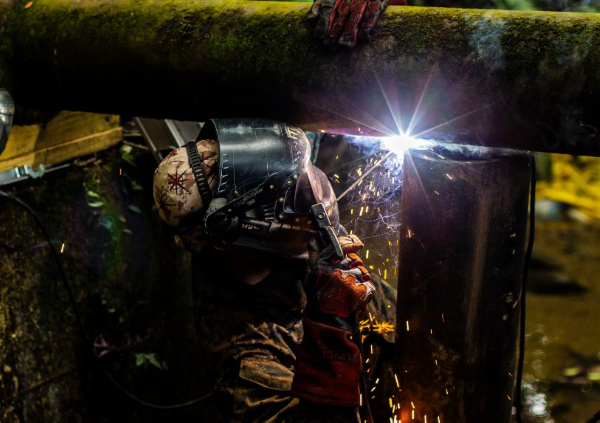
MOS 1316 is a metalworker/welder. They are specialists who attend school to become certified welders within the Marines.
A welder in the Marines may be tasked to repair damaged equipment, reinforce armor or plating on vehicles, or design artwork that will be dedicated and displayed within the unit.
Welders are typically assigned to heavy equipment units.
This is a small MOS with usually only 2 to 3 welding specialists per unit at any given time.
Oftentimes, welders will have a bit more anonymity since their MOS is smaller, but they can be overworked when inundated with a large number of projects all at once.
While deployed, welders will often be very mobile and utilized by multiple units. Welders will be convoyed to locations to come up with new walkways, stairways for guard towers, reinforcing welders on water tanks, and a whole myriad of other situations.
It is a unique occupation that enjoys a small amount of anonymity while in the service and the chance for a very lucrative welding career once in the civilian world.
MOS 1341
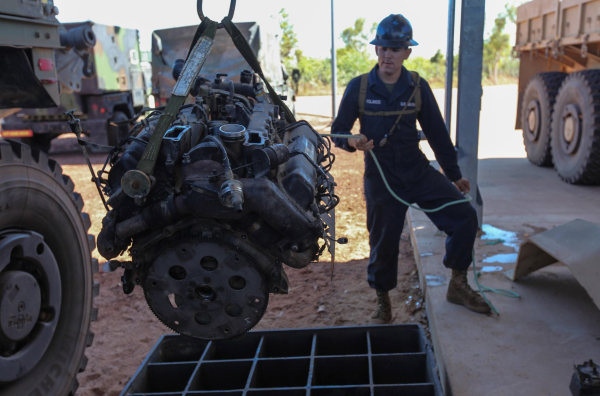
MOS 1341 is the designation for heavy equipment mechanics. These Marines are trained on diesel engines.
They specialize in understanding diesel engine systems and are master mechanics who primarily work on heavy equipment.
Heavy equipment consists of machines like front-end loaders and road graders.
1341 Marines will be assigned to heavy equipment shops that usually consist of an equipment chief, heavy equipment operators, heavy equipment mechanics, and generally welders.
Mechanics will be given daily tasks to accomplish, which can be as simple as doing an oil change to swapping out parts such as fuel pumps and alternators.
While deployed, heavy equipment mechanics will be extremely busy dealing with broken-down equipment, convoying to locations where operators are broken down, and providing on-site support for immediate maintenance if a piece of equipment breaks.
Related Article – Marine Corps MOS List and ASVAB Scores: Details Of All 123 Jobs
They will be tasked with fixing equipment with minimal tools and parts, so mechanics need to be creative and innovative when in this situation.
Additionally, heavy equipment mechanics have the ability to attend various specialty schools to learn more advanced mechanics and more unique vehicles.
An example of this is the assault breacher vehicle mechanic course.
This is a secondary MOS since the assault breacher vehicle is not utilized as frequently in the modern Marine Corps.
MOS 1345
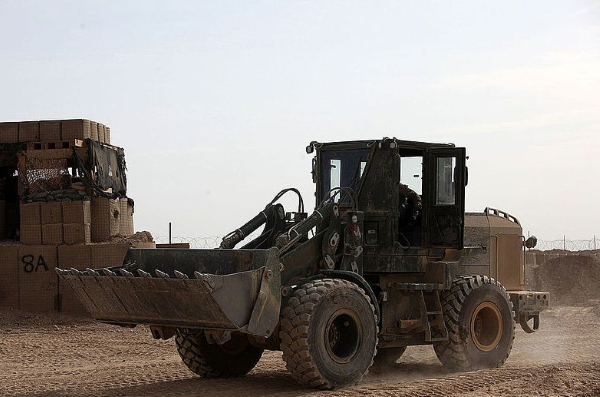
MOS 1345 is the designation for Marine Corps engineer (heavy) equipment operators.
These Marines are trained to operate a variety of pieces of equipment.
Some examples of these are front-end loaders, extended boom forklifts, road graders, and bulldozers.
The day-to-day for heavy equipment operators is almost never slow.
There is always a need for a forklift, loader, or another piece of equipment being used somewhere on the base.
While deployed, heavy equipment operators will be utilized constantly.
They may be assigned to various route-clearing units to provide support and clearing of unknown roads.
Some operators will be assigned to air wing units where they will spend the majority of their deployment loading and unloading pallets on helicopters, C130s, 7-ton trucks, and a number of other vehicles.
Heavy equipment operators are never bored and will always have a task to complete every day.
MOS 1349
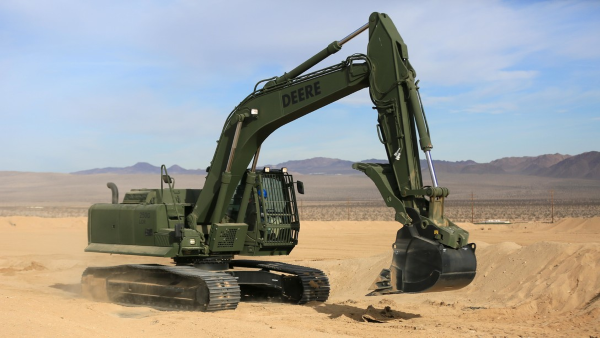
MOS 1349 is the MOS that is only for senior enlisted.
Generally, E7 and above will have the right knowledge and experience to be given this MOS designation.
It is the MOS for heavy equipment chiefs. What do heavy equipment chiefs do?
To be given this title and MOS, a Marine must demonstrate maturity, intelligence, and a thorough knowledge of managing a heavy equipment platoon.
These Marines will attend weekly meetings with senior enlisted and officers and will keep track of the spending and time management within the heavy equipment platoon.
They will ensure that personnel are assigned to the right billets in order to keep the shop functioning smoothly.
Heavy equipment chiefs will gain significant management and leadership experience once tasked with leading an entire heavy equipment platoon.
This is a trait that will easily carry into the civilian world as a possible career path.
MOS 1361
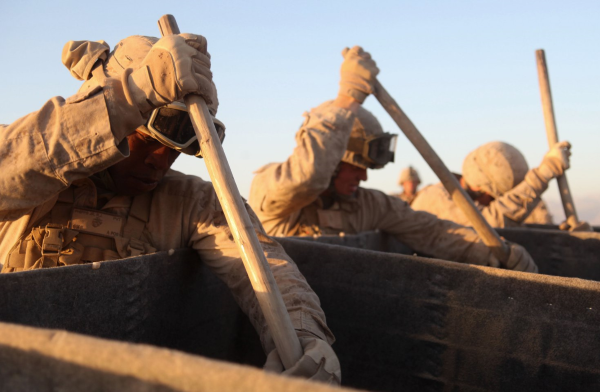
MOS 1361 is the designation for engineer assistant. This MOS is very small and unique, much like welders.
There are usually only 2 to 3 engineer assistants within a battalion or squadron at any one time.
They enjoy some anonymity with their job and usually report straight to a senior enlisted or officer.
Marines within the 1361 MOS stay busy with unique projects and tasks that are unlike any other Marine MOS
These Marines will be tasked with writing up blueprints and build plans for buildings and outposts. They’ll provide surveying on locations to ensure the ground is even with the opportunity for good drainage.
Their equipment is highly technical, valuable, and unique.
It is equipment and training that is used in the civilian world, so anyone considering this career will be prepared to start a career as a surveyor/engineer technician once they get out of the military.
MOS 1371
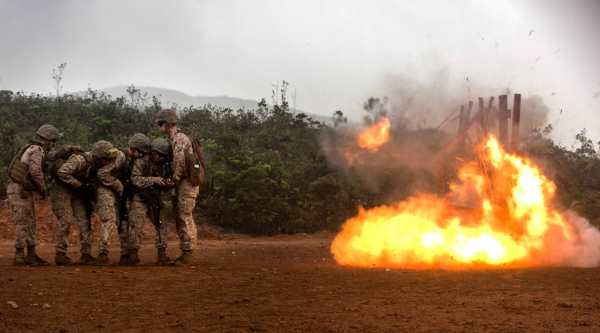
MOS 1371 are known as combat engineers.
They are trained in explosives, room breaching, route clearance, and woodworking.
Combat engineers can be assigned to combat engineering battalions where they will primarily do route clearance and assist with explosives while deployed.
It can be rewarding but also dangerous and require extreme attention to detail to avoid any deadly or extremely serious mistakes.
Also, combat engineers can be stationed at a multitude of other units where they may spend more of their time doing woodworking and repair projects around the base.
Combat engineers are similar to the Navy’s Seabee unit in that they are specialists at establishing rapid outposts through construction and woodworking.
The job that they perform while deployed is largely based on the unit that they are assigned to and the mission of that unit while deployed to combat zones.
MOS 1391
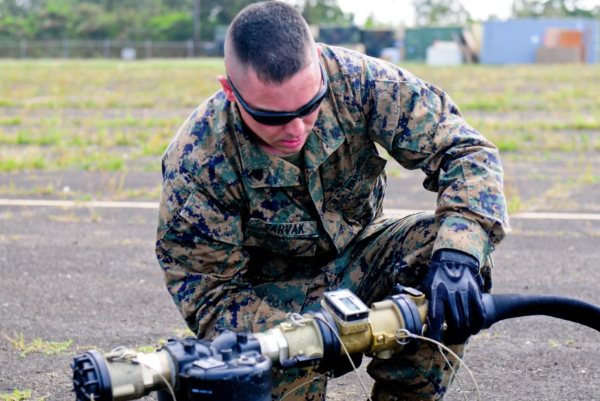
MOS 1391 Marines are the backbone that keeps equipment fueled and on the road.
The bulk fuel specialists are responsible for monitoring the quality of fuel and ensuring that all equipment is fueled within the proper technical parameters and with fuel that is clean and safe.
Fuel is not always readily available while deployed, so it is critical that any fuel being provided to the bulk fuel specialist is tested and maintained to a safe standard that will keep the equipment of the Marines up and running for a long time.
Related Article: 6 Ways To Check If Someone Was In The Military
Additionally, bulk fuel specialists will occasionally be tasked with providing fuel to helicopters, jets, and other aircraft, so it is imperative that this fuel is free of filth and contaminants that could lead to a faulty aircraft or crash.
Bulk fuel specialists often have a lot of downtime, apart from regularly checking fuel quality, since not all equipment has to be fueled constantly.
However, the Marines who work this MOS can know that their assistance at fueling equipment is saving the lives of other Marines who are relying on vehicle support.
Conclusion
All in all, Marines within the 1300 MOS field have a variety of jobs available to them.
Additionally, Marines within this MOS “industry” will be asked to do more hands-on work and manual labor than other MOSs.
The basic engineer MOS requires Marines to have specific aptitudes and capabilities that are more tailored toward critical thinking and problem-solving.
They will receive quality experience during their time in the military and have plenty of opportunities to find work once they enter the civilian workforce.
- 5 Best Jobs for Female Marines - June 20, 2024
- 10 Best Marine Corps Recruiting Videos of All Time - June 20, 2024
- Marine Corps Requirements - June 20, 2024
Originally posted on July 7, 2019 @ 2:53 am
Affiliate Disclosure: This post may contain affiliate links. If you click and purchase, I may receive a small commission at no extra cost to you. I only recommend products I have personally vetted. Learn more.